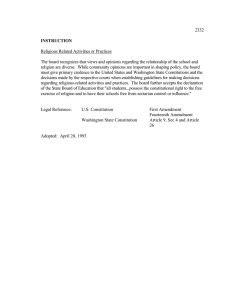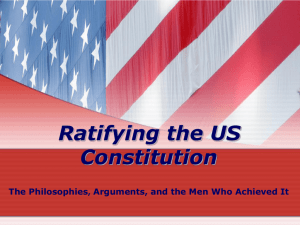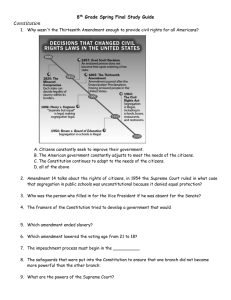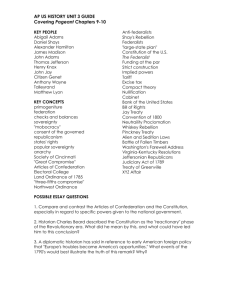Document 15978453
advertisement
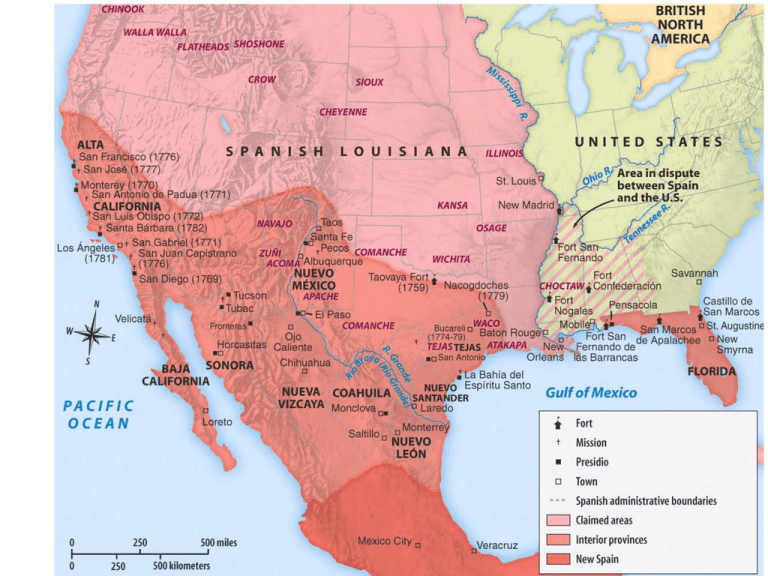
Slave States and Free states In 1787 Three Weaknesses of the Articles of Confederation in force 1781-1789 1. Economic policy – Couldn’t tax, regulate trade or control currency 2. National Security Threats from Britain, Indians, internal revolts 3. Weak Federal Government No executive or judicial branch, Congress could not enforce laws Northwest Ordinance Of 1787 The Signing of the Constitution, September 17, 1787 Two key framers of Constitution James Madison “Father of the Constitution” Alexander Hamilton Two key compromises 1. Great Compromise – New Jersey Plan: Small states wanted one vote per state – Virginia Plan: Big states wanted proportional representation – Great Compromise: House with proportional, Senate with equal votes 2. 3/5 Compromise – Slave states wanted to count slaves for representation – Free states did not – 3/5 Compromise: 3 persons counted for every 5 slaves Three Branches of Government • Article 1: Legislative (Congress) – Pass laws, confirm treaties and judges, declare war • Article 2: Executive (President) – Sign and carry out laws, make treaties, appoint judges, be Commander-in-Chief • Article 3: Judicial (Supreme Court) – Interpret law, especially Constitution Authors of the Federalist Papers: Alexander Hamilton, James Madison, and John Jay Bill of Rights (first 10 Amendments) First Amendment Congress shall make no law respecting an establishment of religion, or prohibiting the free exercise thereof; or abridging the freedom of speech, or of the press; or the right of the people peaceably to assemble, and to petition the Government for a redress of grievances. Second Amendment A well regulated Militia, being necessary to the security of a free State, the right of the people to keep and bear Arms shall not be infringed. Third Amendment – Protection from quartering of troops. Fourth Amendment – Protection from unreasonable search and seizure. Fifth Amendment – Due process, double jeopardy, self-incrimination, private property. • Sixth Amendment – Trial by jury and other rights of the accused. • Seventh Amendment – Civil trial by jury. • Eighth Amendment – Prohibition of excessive bail, as well as cruel and unusual punishment. Ninth Amendment – Protection of rights not specifically enumerated in the Bill of Rights. – The enumeration in the Constitution, of certain rights, shall not be construed to deny or disparage others retained by the people. Tenth Amendment – Powers of states and people – The powers not delegated to the United States by the Constitution, nor prohibited by it to the states, are reserved to the states respectively, or to the people. George Washington in New York Harbor George Washington President, 1789-1797 Key Issues: 1. Financial policies 2. Formation of parties 3. Whiskey Rebellion 4. Jay’s Treaty Federalists Democratic-Republicans Hamilton, Adams Jefferson, Madison Strong central government Weak central government, states’ rights Broad view of Constitution Narrow view of Constitution Pro-business Pro-farmers Support in North, cities Support in South, frontier, rural areas Wealthy, distrust the masses Common, distrust the elite Pro-British Pro-French Control free speech Lots of free speech Whiskey Rebellion Whiskey Rebellion Jay’s Treaty • 1794 treaty between US and Britain that avoided war and improved trade. • Opposed by Jefferson and Madison Damn John Jay! Damn everyone that won't damn John Jay! Damn every one that won't put lights in his window and sit up all night damning John Jay! John Jay, first chief justice of the U.S. Indian Lands Acquired Indian Treaty of Greenville G.W.’s Farewell Address • Avoid sectional divisions between North and South or East and West • Avoid “party spirit” • Religion and Morality “indispensable” • Promote education • Avoid debt • “Steer clear of permanent alliances with any portion of the foreign world” Death of Washington 1799 “First in war, first in peace and first in the hearts of his countrymen.” (Henry Lee) Washington, D.C. 31 States have a Washington County John Adams 2nd President 1797-1801 XYZ affair, cartoon "Civic Feast," 1797 Thomas Jefferson President 1801-1809 Monticello To the shores of Tripoli In 1805, the United States government refused to continue paying Barbary Coast pirates to refrain from raiding American merchant ships. When negotiations for a treaty failed, Jefferson sent an expeditionary force of Marines. Napoleon Anti-Jefferson cartoon The Embargo of 1807 Believing with you that religion is a matter which lies solely between man and his God, that he owes account to none other for his faith or his worship, that the legislative powers of government reach actions only, and not opinions, I contemplate with sovereign reverence that act of the whole American people which declared that their legislature should "make no law respecting an establishment of religion, or prohibiting the free exercise thereof," thus building a wall of separation between church and State. - Thomas Jefferson, 1802 letter to Danbury Baptists University of Virginia HERE WAS BURIED THOMAS JEFFERSON Author of the DECLARATION of AMERICAN INDEPENDENCE of the STATUTE OF VIRGINIA for RELIGIOUS FREEDOM and FATHER OF THE UNIVERSITY OF VIRGINIA James Madison 4th President 1809-1817 Tecumseh Battle of Tippecanoe, 1811 Burning of the capitol The Star-Spangled Banner Andrew Jackson “Old Hickory” Battle of New Orleans, 1815 James Monroe 5th President 1817-1825 “The Era of Good Feelings” Cotton gin invented by Eli Whitney in 1792 The steamboat Ouishita, Artist: George Catlin, 1832-1833 Boston Manufacturing Co. Mills, Waltham, MA, c. 1825 by Elijah B. Smith The Union Manufacturers of Maryland, Palapsco Falls US Cities in 1860 Erie Canal Election Of 1824 John Quincy Adams 6th President 1825-1829 John Quincy Adams in 1848 Andrew Jackson at age 12 Andrew Jackson Expansion of Voting Rights for White Men Election Of 1828 Andrew Jackson 7th President 1829-1837 Cartoon, the Downfall of Mother Bank Jackson slays the Bank Monster Jackson Square in New Orleans Pensacola Nashville The Hermitage $20 bill Second Great Awakening, 1790-1830 Panic of 1837


